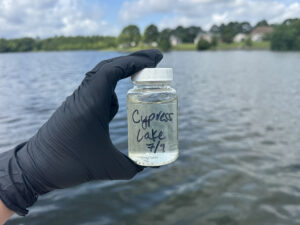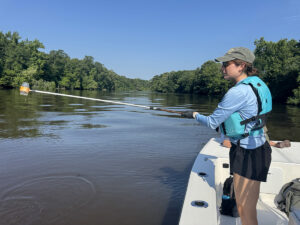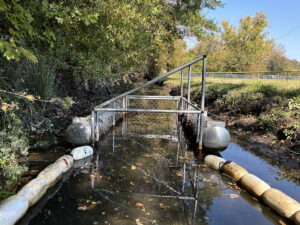News
Court rules to vacate mine permit- Protecting Blounts Creek
Environmental, Regulatory, Sound Rivers
Posted on December 29th, 2017
Breaking News: Blounts Creek Saved from Flooding with Mine Wastewater by Court Order
North Carolina Court Vacates State Permit
A state court late last week vacated a state permit that would have allowed a proposed Martin Marietta mine to discharge millions of gallons of wastewater a day into a popular fishing creek in eastern North Carolina, flooding it. On behalf of Sound Rivers and the N.C. Coastal Federation, the Southern Environmental Law Center fought the N.C. Division of Water Resources’ permit.
The conservation groups argued that the state permit failed to protect the waters of Blounts Creek, which provide vital habitat to a diverse community of fish—including red drum and river herring—and is beloved by fishermen and women and nature lovers across the state.
“This court decision is a victory for the people, affirming citizens’ right to protect the waters we love and use every day when our state fails to do so,” said Geoff Gisler, senior attorney at the Southern Environmental Law Center. “We’re pleased that the court overturned the permit that violated the core requirement of the Clean Water Act: to protect our waters as they exist naturally. The community that uses Blounts Creek deserves the protection that the law provides as affirmed by this court decision.”
Previously, Administrative Law Judge, Phil Berger, Jr., held that local marina owners’ business was a hobby and that citizens who boat and fish on the creek could not challenge the state’s permit. The Beaufort County Superior Court reversed that decision on appeal by conservation groups and granted a formal hearing.
After the formal hearing, Administrative Law Judge Berger again held that the citizen groups could not challenge state water quality permits and that the permit was lawfully issued. Conservation groups appealed this decision and Carteret County Superior Court Judge Joshua Willey, Jr., reversed the administrative judge’s decision in a court order received by SELC late yesterday, finding that the local community had valid concerns and the right to challenge the permit and that the N.C. Department of Environmental Quality in issuing the permit failed to protect the biological integrity of the creek as required by state law.
“This is a win for everyone who loves the special waterways of Beaufort County,” said Heather Deck, executive director and Pamlico-Tar Riverkeeper, Sound Rivers. “Never once did the community waiver in their commitment for the past six years to ensure the creek is protected for future generations. The court upheld our laws and Blounts Creek is protected.”
Martin Marietta’s mine discharge would transform the swampy, slow moving headwater habitat into a fast-flowing stream consisting primarily of mine wastewater, permanently altering the creek’s diversity of fish and abundance of high quality fish habitat.
“This ruling affirms the fundamental requirements of our state and federal water quality laws that require state agencies to protect the biological integrity, fish, and wildlife of our coastal creeks and sounds,” said Todd Miller, executive director of the N.C. Coastal Federation.
In order to develop a 649-acre open pit mine outside Vanceboro in Beaufort County, N.C., Martin Marietta planned to pump up to 12 million gallons of wastewater into Blounts Creek’s headwaters every day.
Martin Marietta admitted in its permit application that the altered creek would no longer support its existing diversity of fish species and would no longer be considered swamp waters due to the increased flow, increased pH, and other changes to the creek that would result from the discharge. DWR’s lead biologist found that the creek with the wastewater would be unlike any creek naturally found in eastern North Carolina. Under federal and state law, North Carolina cannot authorize discharges that will violate water quality standards by changing the natural mix of species in a water body or by destroying uses that are protected by a supplemental classification, such as “swamp waters.”
State wildlife agencies and the Environmental Protection Agency objected to the plan in their response to the draft state permit.
In violation of state and federal law and despite other agencies’ criticisms, the DEQ required no significant changes to address these problems in its final permit.
Related News

Specialist investigates lake connection to mysterious skin rash
July 10th 2025

Riverkeeper: Central NC flooding part of a much larger issue
July 10th 2025

N.C. Governor vetoes bad rulemaking bill
July 10th 2025

Riverkeeper, program director ‘Growing More than Rain Gardens’
July 10th 2025

Volunteer coordinator goes ‘fishing’
July 10th 2025

Neuse fish kill expected to extend beyond holiday weekend
July 3rd 2025

Swim Guide fails prompt Maple Cypress investigation
July 3rd 2025

Riverkeeper, town partners root out source of Smithfield sediment pollution
July 3rd 2025

